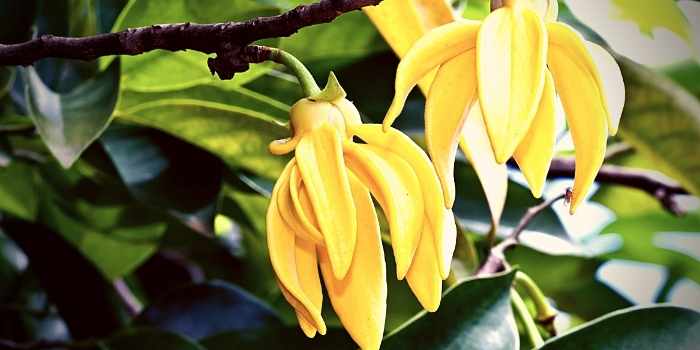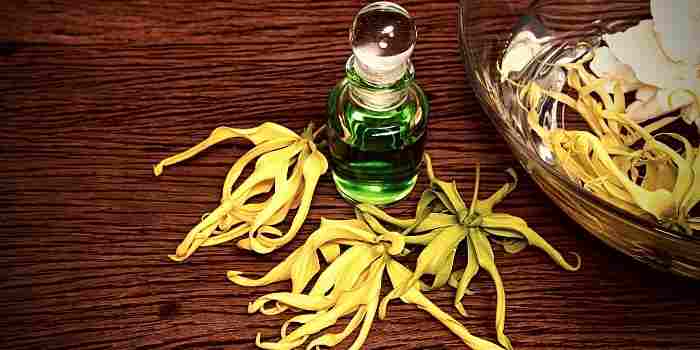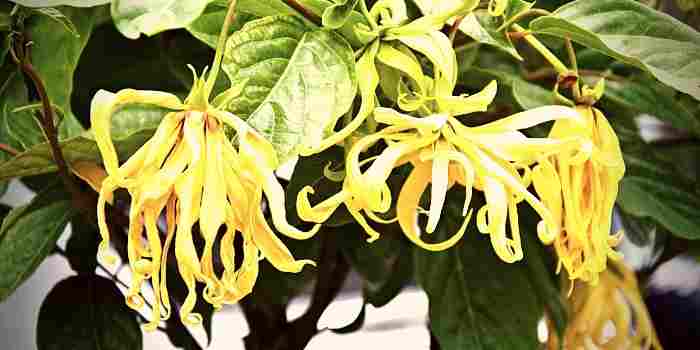
Ylang ylang is an uplifting and healing oil.
Ylang ylang essential oil has been used by many cultures and religions for thousands of years for spiritual benefits.
Still, it is being used as an agent of spiritual healing in the modern age. Some people claim that this aroma has a calming effect on the mind, allowing users to get rid of anxiety and stress.
When it comes to spiritual life, calming and meditative state is critical.
How can you become spiritual when you have too many anxious thoughts?
Yet, you can use ylang ylang essential oil for spiritual benefits.
- Some essential oils have spiritual benefits, people felt more relaxed and connected to nature. The scent of essential oils reminds people the beautiful places such as a forest. Yet, cedarwood for example used for perfume properties.
- Aromatherapy oil you can use for different purposes such as increasing libido, supporting digestion, fighting allergies, better sleep (sedative), and lower skin irritation.
- Essential oils are mostly used by alternative medicine. However, the are medicinal studies shows that these oils become more potent remedies for most problems.
Ylang ylang is an uplifting and healing oil that has been used for centuries for its anti-inflammatory, anti-depressant, and anti-microbial properties. It is popular in the western world because of its therapeutic properties.
Essential Oils

There are a lot of essential oils available on the market today. Essential oils are a natural and inexpensive way to treat ailments. You can use them for cooking, cleaning, and anti-inflammatory and analgesic purposes.
Yet, some essential oils, such as almond oil and coconut oil, may benefit hair health.
Calming Affect More Important

Stress is the enemy of our health. It can affect our mental and physical well-being and our spiritual life. There are many reasons for this, including anxiety and depression and a lack of focus, energy, and concentration that will undoubtedly be an issue if you aren’t careful.
An excellent way to deal with stress is to learn from it to use essential oils such as ylang-ylang and lavender.
The essential oil of ylang-ylang relaxes the neurological system. It relieves symptoms of anxiety, sadness, irritability, and sleeplessness when breathed.
Stress is the enemy of our health. It can affect our mental and physical well-being and our spiritual life. And yet, most of us are unaware that stress is a significant factor in many diseases and medical conditions.
Essential Oils that help balance the root chakra AND Spiritual Level
- Rhododendron Anthopogon
- Elemi Essential Oil
- Dorado Azul Essential Oils For Health
- Basil Essential Oil
- Litsea Cubeba Essential Oil For Health and Anxiety
- Davana oil
- Ylang Ylang Essential Oil
Essential oils are complex mixtures of chemicals that interact with the body, mind, and spirituality in many ways.
Related: Are There Any Essential Oils That Help Root Chakra?
Sedatives
Sleeping is vital for spiritual health as well as psychical health. However, Ylang ylang essential oil has been used for centuries to soothe the body and soul.
You can also use ylang-ylang to relieve anxiety and chronic stress—Ylang-ylang oils will help your nervous system.
A human trial in Thailand found ylang ylang oil helpful in treating depression and stress.
Another research, this time in Malaysia, discovered that smelling ylang-ylang essential oil helps you get more relaxed.
You can use pure essential oils to support your spiritual and emotional life. Also, essential oils can be a useable range of things, such as deodorant and perfumes.
Less Stress
Ylang-ylang oil has long been used as a brain stimulant and stress reliever.
Ylang-ylang oil fights exhaustion and tiredness. It can help reduce muscular spasms when used before a massage. For stress relief, you can use lavender essential oils for relaxation effects.
You can also use aromatherapy massage for relaxing purposes.
Increase sexual desire.
When it comes to sexual desire, hormones are essential. However, hormones are affected mainly by sleep and stress. If you have a high cortisol stress level, you will have less testosterone.
That way, the no direct way you can increase your sexual desire via lowering cortisol levels.
Ylang-ylang oil may be used in many ways, even at home. Still, if not used appropriately, it might be ineffective. In any case,
The effects on ylang-ylang are summarized in a comprehensive review. The essential oil is effective because:
- Antimicrobial
- Insecticide
- Anti-inflammatory
- Antioxidant
- Relaxing
- Antifungal ( Tea tree oil and bergamot oil for this )
You can use it to treat the following diseases and many other things:
- Diabetes
- Fungal diseases
- High blood pressure
- Mild depression
- Sleep disorders
- Oily skin
- Menstrual cramps
- Intestinal infections
By the way, Ylang Ylang is good for anxiety and depression because it increases the production of the well-known hormone Serotonin. As we talked, that way, you might feel more spiritual too.
Serotonin is a neurotransmitter that controls mood, sleep, energy levels, and appetite. If you are stressed about work or have a bad day, you might feel more apathetic and unproductive. Unfortunately, this can lead to anxiety and stress in your life. The serotonin receptors help calm the mind down by spreading out the brain’s serotonin levels.
It also treats insect bites.
There are tons of essential oils available in the market that helps insect bites. The same things happen when it comes to ylang-ylang oil.
Ylang-ylang is an essential oil that helps insects. You can use it to protect from mosquitoes and other unpleasant insects. It also helps in removing the stings from insect bites.
If you have acne problems in your skin, you can use those oils such as:
- Thyme
- Rosemary
- Tea tree oil
- Oregano
These are great for acne and you can use these oils for skin-care purposes.
Anti-eczema
Atopic dermatitis, often known as eczema, is a persistent irritating skin inflammation caused by a sebaceous gland failure. Ylang ylang essential oil helps minimize skin redness and manage sebum production.
Skin moisturizing and toning
Ylang ylang essential oil hydrates and softens our skin.
Hair toning and strengthening
Why do we have to replenish our hair with expensive cosmetics? Why don’t we use natural ingredients to maintain health?
We believe that essential oils can nourish hair and scalp.
Ylang-ylang oil is also proven to benefit our hair in various ways, including preventing hair loss, combating dry scalp, and strengthening hair.
This oil stimulates the skin and regulates sebum production for a healthier scalp and hair. In Israeli research, ylang-ylang oil was one of the significant elements in a head lice treatment.
Natural oils such as Argan essential oils also you can use stimulate hair growth.
Epsom salts
Epsom salts are helpful when it comes to relaxing. You can apply it on the shoulders, back, and even feet.
Infuse a few drops of oil into your preferred hair conditioner or style product to moisturize your skin and hair.
You can use the essential oil in many different ways to reap its benefits.
- Bath additive: Add three to five drops of ylang-ylang to two tablespoons of cream, and you can quickly dissolve it in a warm bath. Relaxing in a hot bath can calm nerves and help with sleeplessness and insomnia.
- Massage oil Ylang Ylang can be used to create a relaxing and sensual massage. Add six drops of essential oil to 1 ounce of good carrier oil to prevent irritation. You can mix it with sweet almond oil. Yet, massage can reduce stress, anxiety, and depression.
- Internal use Ylang Ylang is also used internally to treat cramps, high blood pressure, and sleep problems. A drop of ylang-ylang oil can be dissolved in honey or stevia and mixed into tea.
- Aromatherapy Yes. You can use Aromatherapy Ylang Ylang can also be used in aroma lamps and diffusers. A few drops of essential oil can be evaporated, mixed with water, or added to sandalwood oil. This creates a relaxing, sensual atmosphere in the room.
There are other essential oils you can use for other benefits, such:
- Antiseptic
- Digestive support
- Circulation
- Stress-relief
- Wounds healing
- Allergenic reliving
- Ease headaches
For any wide range of symptoms, you can use aromatherapies.
As we can see, there are many ways to use ylang-ylang oil. Yet, relaxing properties will helps to improve the spiritual level and make you feel more meditative. Other essential oils such as Clary sage used by holistic aromatherapists for relaxing purposes.
Some essential oil blends will increase the effectiveness of healing properties.

